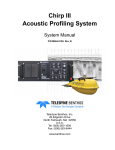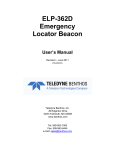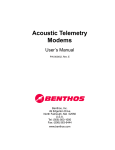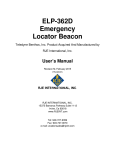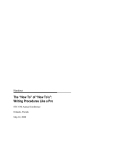Download PSA-916 Sonar Altimeter User`s Manual
Transcript
PSA-916 Sonar Altimeter User’s Manual Revision B, Mar 2006 P/N 007217 Teledyne Benthos, Inc., Inc. 49 Edgerton Drive North Falmouth, MA 02556 www.benthos.com Tel: 508-563-1000 Fax: 508-563-6444 e-mail: [email protected] PSA-916 Sonar Altimeter i Preface This User Manual provides complete instructions on using and maintaining the PSA-916 Sonar Altimeter. Please read it prior to deploying the equipment and keep it where it can provide a reference during setup and operation of the altimeter. This manual is divided into the following eight sections: 1 2 3 4 5 6 7 8 Description Specifications Setup and Deployment Theory of Operation Packing List Drawing List Return Procedures Warranty Proprietary Information The information, description, and illustrations in this manual are the property of Teledyne Benthos, Inc. Materials may not be reproduced or disseminated without the prior written consent of Teledyne Benthos, Inc. Changes Teledyne Benthos, Inc. reserves the right to make changes to meet new specifications at any time without incurring any obligation to modify previously installed units. This manual is provided for informational and reference purposes only and is subject to change without notice. Notes and Warnings Where applicable, special notes and warnings are presented as follows: NOTE: A reminder to check that certain criteria are met before proceeding further in a step or sequence. WARNING: A reminder that dangerous consequences could result if certain recommended procedures are not followed User’s Manual Mar. 2006 PSA-916 Sonar Altimeter ii Table of Contents 1 Description ...................................................................................................................................... 1 Applications ............................................................................................................................... 2 2 Specifcations ................................................................................................................................. 3 3 Setup and Deployment ............................................................................................................ 5 Unpacking and Disassembly........................................................................................... 5 Connection.................................................................................................................................. 6 Connector Pin-out....................................................................................................................... 6 RS-232 Input/Output................................................................................................................... 7 Error Output................................................................................................................................ 8 Analog Output............................................................................................................................. 8 External Key................................................................................................................................ 8 FSI Mode ..................................................................................................................................... 8 Configuration ............................................................................................................................. 9 Predeployment ....................................................................................................................... 10 Deployment............................................................................................................................... 11 Maintenance ............................................................................................................................ 12 4 Theory of Operation................................................................................................................. 13 Operating Principle.............................................................................................................. 13 Board Level Description................................................................................................... 14 Power Supply ............................................................................................................................ 14 Transmitter................................................................................................................................ 14 Receiver ..................................................................................................................................... 14 Microcontroller......................................................................................................................... 14 Firmware Description ........................................................................................................ 14 Main Program........................................................................................................................... 15 Averaging Algorithm ................................................................................................................ 15 Diagnostics ............................................................................................................................... 16 Analog output............................................................................................................................ 16 Error Message .......................................................................................................................... 17 5 Packing List .................................................................................................................................. 18 6 Drawing List.................................................................................................................................. 19 7 Return Procedures ................................................................................................................... 20 8 Warranty.......................................................................................................................................... 21 User’s Manual Mar. 2006 PSA-916 Sonar Altimeter 1 1 Description The PSA-916 Sonar Altimeter is a microprocessor-controlled, self-contained, underwater acoustic product. It generates a narrow beam acoustic signal and measures the travel time for the signal to bounce back from the target surface. The unit provides range data in both analog and digital formats for analysis and process control. The PSA-916 Sonar Altimeter is the same as the standard PSA-916 Sonar Altimeter except it is housed in a corrosion-resistant pressure case. It is O-ring sealed and rated for operation in water depths up to 6,000 meters. The external 6-pin connector provides connections for external power source input, external key source/RS-232 input, analog, and RS-232 output. PSA-916 Sonar Altimeter User’s Manual Mar. 2006 PSA-916 Sonar Altimeter 2 Applications The Model PSA-916 Sonar Altimeter with the built-in flexibility of its microprocessor design, cost-effectively meets a wide variety of sonar measurement applications with a single self-contained instrument. The most common use of the Model PSA-916 Sonar Altimeter is for altitude measurement (height above bottom). Other uses include: Wave height measurement Obstacle avoidance Altitude of an ROV and other submersibles Surveying of shallow waters Sediment transport studies User’s Manual Mar. 2006 PSA-916 Sonar Altimeter 3 2 Specifcations TRANSMIT FREQUENCY: 200 kHz TRANSMIT PULSE WIDTH: 250 microseconds BEAM PATTERN: 14° conical PULSE REPETITION RATE: Selectable: Internal or External Internal - 5 pulses per second External - customer controlled rate, up to 5 pulses per second RANGE: 100 meters full scale; 1.0 meter guaranteed minimum; 0.8 meter typical ANALOG OUTPUT: 0 to 5 VDC DIGITAL OUTPUT: RS-232, baud rate 9600, 4800, 2400 or 1200, (user selectable) RESOLUTION: RS-232: 1 cm Analog: 2.5 cm POWER REQUIREMENT: 6 to 24 VDC CURRENT: 50 mA @ 15 VDC 100 mA @ 6 VDC OPERATING DEPTH: 6,000 meters CONNECTOR: Part Number: Impulse XSG-6-BLC-3/416, or equivalent MATING PIGTAIL: Part Number: Impulse RMG-6-FS, or equivalent DIMENSIONS: 2 1/4 in. OD x 9.38 in. long WEIGHT: In Air: 1.4 lb In Water: 0.8 lb User’s Manual Mar. 2006 PSA-916 Sonar Altimeter 4 Configuration Standard FSI Mode Custom Description of Configuration Key (SW 1 & 2) Internal Internal Serial Output (SW 1 & 2) Every Cycle N/A Gain (SW 3) High High Under Range Detection (SW 4) Disabled Disabled Baud (SW 5 & 6) 9600 9600 FSI Mode (SW 7) Disabled Enabled RS-232 Mode (SW 8) Enabled Enabled SW 1 OFF OFF SW 2 ON OFF SW 3 ON ON SW 4 ON ON SW 5 OFF OFF SW 6 OFF OFF SW 7 OFF ON SW 8 OFF OFF JP1 Installed Installed JP2 Installed Installed JP3 1-2 (RS-232 Out) 1-2 (RS-232 Out) Dip Switches Jumpers JP4 1-2 (External Key In) Installed 2-3 (RS-232 In) Configuration: Standard ______ FSI Mode ______ Custom ______ NOTE: User’s Manual The configuration is set by the dip switches. This page describes how the unit was configured when shipped to you. Any changes to the dip switches will change the configuration. Refer to Section 3. Mar. 2006 PSA-916 Sonar Altimeter 5 3 Setup and Deployment This section provides information on unpacking, installation and general operation of the PSA-916 Sonar Altimeter. Unpacking and Disassembly As with any sophisticated electronic equipment, Teledyne Benthos, Inc.'s products should be handled with a reasonable amount of care when unpacking, transporting or storing. When shipped from the factory, the units are packed in weatherproof cartons. Every effort is made at the factory to pack the equipment so as to protect it during shipment and to minimize the effect of any mishandling. Carefully inspect each instrument for physical damage as it is unpacked. Report any damage to the freight carrier and to the Teledyne Benthos, Inc. sales office. Store the shipping cartons and packing materials in a cool, dry place for later use in system transport. The unit is shipped completely assembled and internally configured. Should an internal inspection be deemed necessary, the unit can be opened by turning the delrin closure ring counter-clockwise. The transducer and electronics should slide easily from the pressure case. Caution is advised as the electronics is connected to the interface connector at the opposite end of the pressure case. NOTE: User’s Manual An O-ring seal is designed into the pressure case/end cap to protect the electronic components from moisture. A failure of these seals will result in the unit flooding and subsequent loss. Whenever the unit is disassembled, carefully inspect the O-rings for cracks, tears, and proper fit. Replace any damaged O-rings. The end cap O-ring grooves and housing O-ring mating faces should also be checked for tool marks or abrasions. Mar. 2006 PSA-916 Sonar Altimeter 6 Prior to reassembling the unit, clean O-rings and O-ring surfaces, apply a coat of silicone lubricant to the O-rings. Reposition the internal components in the casing and tighten the closure ring, turning it in a clockwise fashion. WARNING: DO NOT apply excessive torque to the closure ring. Overtightening of the closure ring could damage the ring and make any future disassembly difficult If you suspect that there are items missing, or if you suspect that there has been any damage to the equipment, contact Teledyne Benthos, Inc. immediately. Connection The PSA-916 Sonar Altimeter outputs data and receives power through a 6 pin connector. The PSA-916 Sonar Altimeter is supplied with the mating pigtail and a dummy plug. Whenever the pigtail is not installed, install the dummy plug to protect the connector pins. Connector Pin-out The functional assignments of the six pin connector is as follows: Pin Number NOTE: Function 1 2 RS-232 Input/External Key Input * External power ground 3 RS-232 Output/Error Output† 4 Analog output 5 Analog output ground 6 External power (6 - 24V) *To select RS-232 Input install a jumper between JP4 pins 2 & 3. To select External Key Input install a jumper between JP4 pins 1 & 2. †To select RS-232 Output install a jumper between JP3 pins 1 & 2. To select Error Output install a jumper between JP3 pins 2 & 3. User’s Manual Mar. 2006 PSA-916 Sonar Altimeter 7 Connector view, looking at the PSA-916 Sonar Altimeter RS-232 Input/Output The RS-232 communications port is set to the following parameters: Baud: Number of Data Bits: Number of Stop Bits: Parity: 1200,2400,4800, or 9600 user selectable 8 1 none On power up the following banner message will be output: “Benthos PSA-916 V1.2" Where the number following the V is the firmware version. The serial output will be in the following format: Rxx.xx<cr><lf> where xx.xx can range from 0.80 to 99.99. If no echo was received the output will be R99.99E<cr><lf>. If an echo was missed or the value does not meet the averaging criteria then an “E” will be appended to the previous value. If under range detection is selected and the value is under range then a ‘<’ will be appended to the data. If the unit is not functioning correctly, “E1,<cr><lf>” will be output. If this occurs see section 4.4.3. User’s Manual Mar. 2006 PSA-916 Sonar Altimeter 8 Error Output This output is useful for indicating the validity of the data whenever the analog output is the source of range output. This line will be a logic 1 (5 volts) whenever no echo was detected in the last range interrogation cycle. Essentially this line is high whenever it would be necessary to output an E on the serial output. This line also goes high if error condition E1 occurs. If this line is low it can be assumed that the altimeter is functioning normally and the analog output is valid. Analog Output The analog output ranges from 0 VDC to 4.98 VDC, which represents 0.00 to 99.99 meters. Note that if no echo is received, the output will go to full scale (4.98 VDC). External Key This line is used to tell the PSA-916 Sonar Altimeter to take a range reading. The altimeter looks for a transition from a logic 1 (5 volts) to a logic 0 (0 volts). Once the transition is detected the altimeter will take a range reading and wait 200 ms before looking for the next transition. Thus the minimum time between key pulses is 200 ms. However, there is no maximum limit to the time between key pulses. Note that the analog value will be valid 200 ms after sending the external key. FSI Mode In FSI mode the unit acquires range information once every 200 ms, but only reports the range data over the RS-232 output after receiving a #Z through the RS232 input. User’s Manual Mar. 2006 PSA-916 Sonar Altimeter 9 Configuration There are eight switches which determine the mode of operation. The different combinations are listed in the table below. DIP SWITCHES - All dip switch changes will take affect immediately, except for the baud rate. To change baud rate the unit must be reset (i.e. cycle power). Description SW1 SW2 Test mode - see section 4.4 ON ON External key - 200 ms min. between keys ON OFF Internal key - serial out every depth cycle OFF ON Internal key -serial out every fifth depth cycle OFF OFF SW3 SW5 SW6 1200 baud (rep rate may be > 200 ms) ON ON 2400 baud ON OFF 4800 baud OFF ON 9600 baud OFF OFF More gain ON Less gain OFF Disable under-range detection Under-range detection SW4 SW7 SW8 ON OFF (if range is less than 0.8, then output is ’0.8<’) RS-232 off ON RS-232 on OFF FSI mode disabled OFF FSI mode enabled ON User’s Manual Mar. 2006 PSA-916 Sonar Altimeter 10 Predeployment Always test the altimeter immediately before deployment to ensure that the unit can transmit and receive acoustic signals and that the system parameters are correctly set. NOTE: Always test the operation of each PSA-916 Sonar Altimeter as a stand-alone instrument before integrating it into another system. Teledyne Benthos, Inc. recommends that an in-air test be performed followed by a short range in-water test prior to the actual deployment. A major source of problems with acoustic equipment is that the transducer is not clean and acoustic signals are masked. We strongly recommend that prior to each deployment that the user clean the exterior of the pressure casing and transducer with fresh water and a mild detergent. Do not use glass cleaner. To perform the in-air test: Turn the altimeter ON by applying power. Verify that the RS-232 output is 99.99E and that the analog output is 4.98V. Note that if under-range detection is enabled, verify the RS-232 output is’0.8<’ and the analog output is 39.8 mv. If under-range detection is not enabled, tap on transducer face with a finger, and verify that the RS-232 and analog output changes. If the in-air test was successfully completed, proceed to an in-water test. Make sure the transducer is well below the keel of the boat and away from prop wash and noise. A test tank or barrel filled with water can be used provided the water depth is at least three feet. User’s Manual Mar. 2006 PSA-916 Sonar Altimeter 11 Deployment Once you are confident that the unit is operating properly on its own, you can then integrate it with other instrumentation used in your application. If acoustic energy generated by other instruments is strong enough, it can adversely affect PSA-916 Sonar Altimeter operation, even if the acoustic output of the other instrumentation is at different frequencies. You may have to relocate or reposition the PSA-916 Sonar Altimeter to achieve reliable results. Make sure sources of noise and turbulence such as the boat propeller and ROV thruster motors are not between the altimeter and the target surface, and that they are well away from the transducer. Securely fasten the PSA-916 Sonar Altimeter to its platform, vehicle or instrument package, making sure there are no obstructions between the transducer face and the intended target. When mounting be sure the anodized finish is not scratched or gouged by clamps, bolts, etc. If the unit is mounted on an underwater vehicle, be sure that the sound beam path is perpendicular to the horizontal flying position of the vehicle. Note that excessive pitch or roll motion will influence the PSA-916 Sonar Altimeter range measurement. The PSA916 Sonar Altimeter radiation pattern is 14°. Make sure the altimeter is attached to the bottom of the ROV so that it is not affected by echoes from the skids. In applications using multiple altimeters within each others range, their transmissions should be externally triggered to avoid crosstalk between the units. The sound beam pattern is an important consideration. The pattern consists of the main beam and small side lobes stemming from it. Certain conditions may cause range errors from side-lobe reflections. A strong acoustic reflector close to the instrument reflects a side-lobe signal before the main beam echo is received. When using a towed vehicle to measure depth, a steep slope reflects the side lobe before the main beam is reflected by the bottom directly below the instrument. The side lobe reflects off the bottom before a main beam aimed diagonally at the seabed. User’s Manual Mar. 2006 PSA-916 Sonar Altimeter 12 Maintenance If you exercise reasonable care, your Teledyne Benthos, Inc. products should provide you with years of reliable service. To ensure an even greater level of reliability, Teledyne Benthos, Inc. recommends that you take a few preventive maintenance measures and that you contact Teledyne Benthos, Inc. early in your efforts to troubleshoot an altimeter malfunction. We have found that most problems are related to the acoustic environment and can be solved with applications planning and pre-deployment testing. The following steps will help you maintain protection against damage to the altimeter. When you retrieve the unit at the completion of a project, follow these preventive maintenance procedures: Turn the unit OFF by unplugging the mating connector. Clean the exterior of the pressure casing and transducer with fresh water and a mild detergent. DO NOT USE GLASS CLEANER. NOTE: It is important to clean the transducer face so that film does not build up on the transducer face and attenuate acoustic signals. Dry the unit with a cloth. Inspect the transducer and the exterior of the casing for signs of wear and damage. Clean the connector on the unit using a lint free alcohol wipe. Lubricate the connector O-ring mating surface with a light coat of silicone and place the protective dummy plug on the connector. Store the unit, in its original packing case, in a cool, dry place. Teledyne Benthos, Inc. recommends that the O-rings in this unit be inspected after every deployment and changed if there is any sign of wear or damage. Otherwise, O-rings should be changed every two years per manufacturer recommendations. Size 2-125 Transducer O-ring 2-029 Transducer Housing O-ring User’s Manual Mar. 2006 PSA-916 Sonar Altimeter 13 4 Theory of Operation This section describes the operation of the PSA-916 Sonar Altimeter. DO NOT ATTEMPT REPAIR of the PSA-916 Sonar Altimeter unless you are a trained electronics technician. For help with any questions about using or maintaining the instrument, contact your local Teledyne Benthos, Inc. representative, or call Teledyne Benthos, Inc. Customer Service at 508-563-1000. Operating Principle The PSA-916 Sonar Altimeter determines the round trip time for a sound pulse to travel from the transducer through the water, reflecting off a surface and returning to the transducer. Since the speed of sound is known, the altimeter can determine the range utilizing this equation: R = 1/2 (Cs)(t +/-∆ t) Where: Cs - the speed of sound in meters per second t - the total round-trip travel time in seconds R - range in meters The nominal speed of sound is 1,500 meters per second in water, and is used by the PSA-916 Sonar Altimeter. Note that the speed of sound is affected by temperature, salinity, and pressure. The ∆ t factor is the jitter or the ability of the detectors to accurately determine the presence or absence of a pulse. Jitter is a function of operating frequency, system bandwidth and signal to noise ratio. In the PSA-916 Sonar Altimeter ∆t is approximately 5 microseconds or approximately +/-0.4 cm total distance. Since the total travel time is divided by two in the above formula, the jitter error is +/-0.2 cm. User’s Manual Mar. 2006 PSA-916 Sonar Altimeter 14 Board Level Description Power Supply The input power can range from 6 to 24 volts, and is diode protected by CR1 to prevent reverse polarity. The power supply regulates the input power to 5 VDC and 12 VDC. Transmitter The microprocessor generates a key pulse putting the transceiver into the transmit mode for the duration of the pulse. A train of 1 µs pulses is output from the transceiver at the oscillator frequency of 200 kHz, which are later stretched to 1.8 µs pulses. These pulses are then boosted to drive the transducer with a sinusoidal 200 kHz burst lasting for the duration of the key pulse. Receiver The transmit pulse and any received echoes are input to the receiver through a transmit/receive network. The receive signal is attenuated during transmit and during the first few milliseconds of the receive cycle, when the returned echoes are likely to be the strongest. Once the transceiver senses the receive signal, it goes through a high gain amplifier, and uses the same circuitry as the transmitter, so the receiver and transmitter are always tuned to the same frequency. Microcontroller The microcontroller provides the system timing and computing power operating a crystal controlled clock frequency of 12 MHz and is initialized via a power reset when power is applied. The microcontroller also generates the error output and sends data to the 12-bit digital to analog converter for the analog output and the RS-232 driver. User’s Manual Mar. 2006 PSA-916 Sonar Altimeter 15 Firmware Description Main Program The program generates the key pulse, which causes a 200 kHz burst to be transmitted as described in section 4.2.2. The transmission is detected by interrupt 1, which starts a 1µs timer. If the transmission is not detected, the program will output “E1" on the RS-232 output. The program then waits 133 ms for an echo. Once an echo is received, it stops the timer, and calculates the range. If no echo is received, the timer is stopped and the range is assumed to be 99.99 meters. The range is then sent to the RS-232 and Analog outputs, and the error output is set or cleared as required. If in internal Key mode the microcontroller will wait 200 ms from the previous key before sending another key pulse, thus starting the whole cycle over again. If in external Key mode, the microcontroller will wait for a low going pulse on the key In input, before sending the next key pulse. Averaging Algorithm A moving weighted average is used. Each new range is given a weight of 25%, while the previous value is given a weight of 75%. In addition if the new range differs significantly from the old range then the new range will be skipped and the old range will be used. Note that the algorithm will not skip more than two consecutive ranges. If two consecutive ranges have been skipped, then the next new range will be used. Note that if a range is skipped then an “E” is appended to the data and the error output is goes to a logic ‘1' (5VDC). User’s Manual Mar. 2006 PSA-916 Sonar Altimeter 16 Diagnostics Analog output The analog output can be tested by using the DIP switches to put the altimeter in test mode. The following table shows the dip switch settings and the corresponding analog output. SW1 SW2 SW3 SW4 SW5 OUTPUT SERIAL OUTPUT ON ON ON ON ON 0 Volts Analog out - 0V ON ON ON ON OFF 1 Volt Analog out = 1V ON ON ON OFF ON 2 Volts Analog out = 2V ON ON ON OFF OFF 3 Volts Analog out = 3V ON ON OFF ON ON 4 Volts Analog out = 4V ON ON OFF ON OFF 5 Volts Analog out = 5V ON ON OFF OFF ON ON ON OFF OFF OFF Teledyne Benthos, Inc. Use Teledyne Benthos, Inc. Use WARNING: Do not set to the " Teledyne Benthos Use" position, or damage may result. User’s Manual Mar. 2006 PSA-916 Sonar Altimeter 17 Test Points: TP1 Detector: normally a logic 1 (5 VDC), whenever a transmission or a received echo is detected the line goes to a logic 0 (0 VDC) for the duration of the detection. TP2 Transmit Pulse: normally a logic 1 (12 VDC). During transmit a train of 1.8 µs pulses at the transmit frequency. TP3 Oscillator during Transmit cycle, and amplified output of the receiver. Note that the scope capacitance will alter the signal. TP5 Transmitter Key: Normally 0 VDC, during transmit it is at 0.6 VDC lasting for 250 µs. TP6 2.5 VDC TP7 Analog Output TP8 12 VDC TP9 5 VDC Top side view of PCB assembly Error Message If Error message E1 is continuously output, it means the receiver is unable to detect the transmission of the transmitter. Check that Jumper JP1 is installed, and that the ground wire from the end cap to J2 is connected. Otherwise the most likely source of the failure is something within the transceiver circuitry. Contact Teledyne Benthos, Inc. for repair information or refer to Section 7 Return Procedures in this User’s Manual. User’s Manual Mar. 2006 PSA-916 Sonar Altimeter 18 5 Packing List Item Qty 1 1 2 1 RMG-6-FS 3 1 RMG-6-FSD-HP 4 1 007217 5 2 G-FLS-P-F User’s Manual Part No. — Manufacturer Description Teledyne Benthos, Inc. Impulse, or equivalent Impulse, or equivalent Teledyne Benthos, Inc. Impulse, or equivalent PSA-916 Sonar AltimeterTop Assembly Connector, 6 pin, pigtail Connector, 6 pin, dummy Manual, PSA-916 Sonar Altimeter Locking Sleeve-Female Mar. 2006 PSA-916 Sonar Altimeter 19 6 Drawing List 9.41 1.60 2.38 1.78 Model # Serial # 2.00 PSA-916 XXXX PRESSURE TESTED TO XXXXX PSI www.benthos.com Made in USA PSA-916 Outline Drawing PSA-916 Pinout Drawing User’s Manual Mar. 2006 PSA-916 Sonar Altimeter 20 7 Return Procedures If you need to return an PSA-916 Sonar Altimeter for warranty service, contact Teledyne Benthos, Inc. for a Return Material Authorization (RMA) number and shipping instructions. Teledyne Benthos, Inc. Tel: 508-563-1000 Fax: 508-563-6444 e-mail: [email protected] You will need to provide the following information to receive a Return Material Authorization (RMA): Reason for return Number of altimeters to be returned Serial number of each unit Shipping method, if applicable NOTE: User’s Manual Do not ship an altimeter without a Return Material Authorization. Mar. 2006 PSA-916 Sonar Altimeter 21 8 Warranty LIMITED WARRANTY. Teledyne Benthos, Inc. warrants that the products sold hereunder shall be free from defects in materials and workmanship under normal use and service when correctly installed, used and maintained for a period of 12 months from date of shipment from Teledyne Benthos, Inc. Purchaser’s receipt of any product delivered hereunder shall be an unqualified acceptance of and a waiver by Purchaser of the right of Purchaser to make a claim with respect to such product unless Purchaser gives Teledyne Benthos, Inc. notice of any claim within 12 months after the receipt of such product. This warranty is limited to repair or replacement of the said product at Teledyne Benthos, Inc. plant in North Falmouth, Massachusetts, providing the product was not abused or operated other than in accordance with the Teledyne Benthos, Inc. instruction manuals. Since all Teledyne Benthos, Inc. oceanographic instruments are pressure tested to rated depth prior to shipment, Teledyne Benthos, Inc. does not assume responsibility for any damage due to leakage or implosion. Teledyne Benthos, Inc. reserves the right to modify its warranty at any time, in its sole discretion. THIS LIMITED WARRANTY IS NOT TRANSFERABLE. LIMITATION OF LIABILITY. TELEDYNE BENTHOS, INC. MAKES NO OTHER WARRANTY REGARDING ITS PRODUCTS OR THE PRODUCTS OF OTHERS EITHER EXPRESS OR IMPLIED; AND, ANY IMPLIED WARRANTY OF MERCHANTABILITY OR FITNESS FOR A PARTICULAR PURPOSE WHICH EXCEEDS THE FORGOING WARRANTIES IS HEREBY DISCLAIMED BY TELEDYNE BENTHOS, INC. AND EXCLUDED FROM ANY AGREEMENT MADE BY ACCEPTANCE OF ANY ORDER. TELEDYNE BENTHOS, INC. DOES NOT ACCEPT LIABILITY BEYOND THE REMEDIES SET FORTH HEREIN INCLUDING ANY LIABILITY FOR PRODUCTS NOT BEING AVAILABLE FOR USE OR FOR LOST OR CORRUPTED DATA, LOSS OF BUSINESS, LOSS OF PROFITS, LOSS OF USE OF THE PRODUCT OR ANY ASSOCIATED EQUIPMENT, COST OF CAPITAL, COST OF SUBSTITUTE OR REPLACEMENT PRODUCT, FACILITIES OR SERVICES, DOWN-TIME, CHARGES FOR PURCHASER’S TIME AND EFFORT, THE CLAIMS OF THIRD PARTIES, INJURY TO PROPERTY, OR ANY OTHER DIRECT, INDIRECT, SPECIAL, RELIANCE, INCIDENTAL OR CONSEQUENTIAL DAMAGES, REGARDLESS OF THE NATURE OF THE CLAIM AND WHETHER OR NOT FORESEEABLE AND WHETHER OR NOT BASED ON BREACH OF WARRANTY, CONTRACT OR TORT (INCLUDING NEGLIGENCE) OR STRICT LIABILITY, EVEN IF TELEDYNE BENTHOS, INC., INC. HAS BEEN ADVISED OF THE POSSIBILITY OF SUCH DAMAGES, OR FOR ANY CLAIM BY ANY THIRD PARTY EXCEPT AS EXPRESSLY PROVIDED HEREIN. THIS LIMITATION OF LIABILITY APPLIES BOTH TO PRODUCTS AND SERVICES AND SUPPORT PROVIDED PURCHASER UNDER THIS AGREEMENT. NO ORAL OR WRITTEN INFORMATION OR ADVICE GIVEN BY TELEDYNE BENTHOS, INC. ITS AGENTS OR EMPLOYEES SHALL CREATE A WARRANTY OR IN ANY WAY INCREASE THE SCOPE OF THE LIMITED WARRANTY PROVIDED ABOVE. ANY AND ALL LIABILITY OF TELEDYNE BENTHOS, INC. IS EXPRESSLY LIMITED TO THE PRICE PURCHASER HAS PAID FOR THE PRODUCTS. PURCHASER’S SOLE REMEDY AGAINST TELEDYNE BENTHOS, INC. IN ANY DISPUTE UNDER THIS AGREEMENT SHALL BE TO SEEK RECOVERY OF THE AMOUNTS PURCHASER PAID, PURSUANT TO THE LIMITED WARRANTY PROVIDED ABOVE, UPON THE PAYMENT OF WHICH TELEDYNE BENTHOS, INC. ITS AGENTS AND EMPLOYEES, AND AFFILIATES, WILL BE RELEASED FROM AND DISCHARGED OF ALL FURTHER OBLIGATIONS AND LIABILITY TO PURCHASER. THE LIMITED WARRANTY OF TELEDYNE BENTHOS, INC. GIVES PURCHASER SPECIFIC LEGAL RIGHTS, AND PURCHASER MAY ALSO HAVE OTHER RIGHTS THAT VARY FROM STATE TO STATE. SOME STATES DO NOT ALLOW LIMITATIONS ON HOW LONG AN IMPLIED WARRANTY LASTS OR THE EXCLUSION OR LIMITATION OF INCIDENTAL OR CONSEQUENTIAL DAMAGES, SO THE ABOVE LIMITATIONS OR EXCLUSIONS MAY NOT APPLY TO PURCHASER. User’s Manual Mar. 2006
























